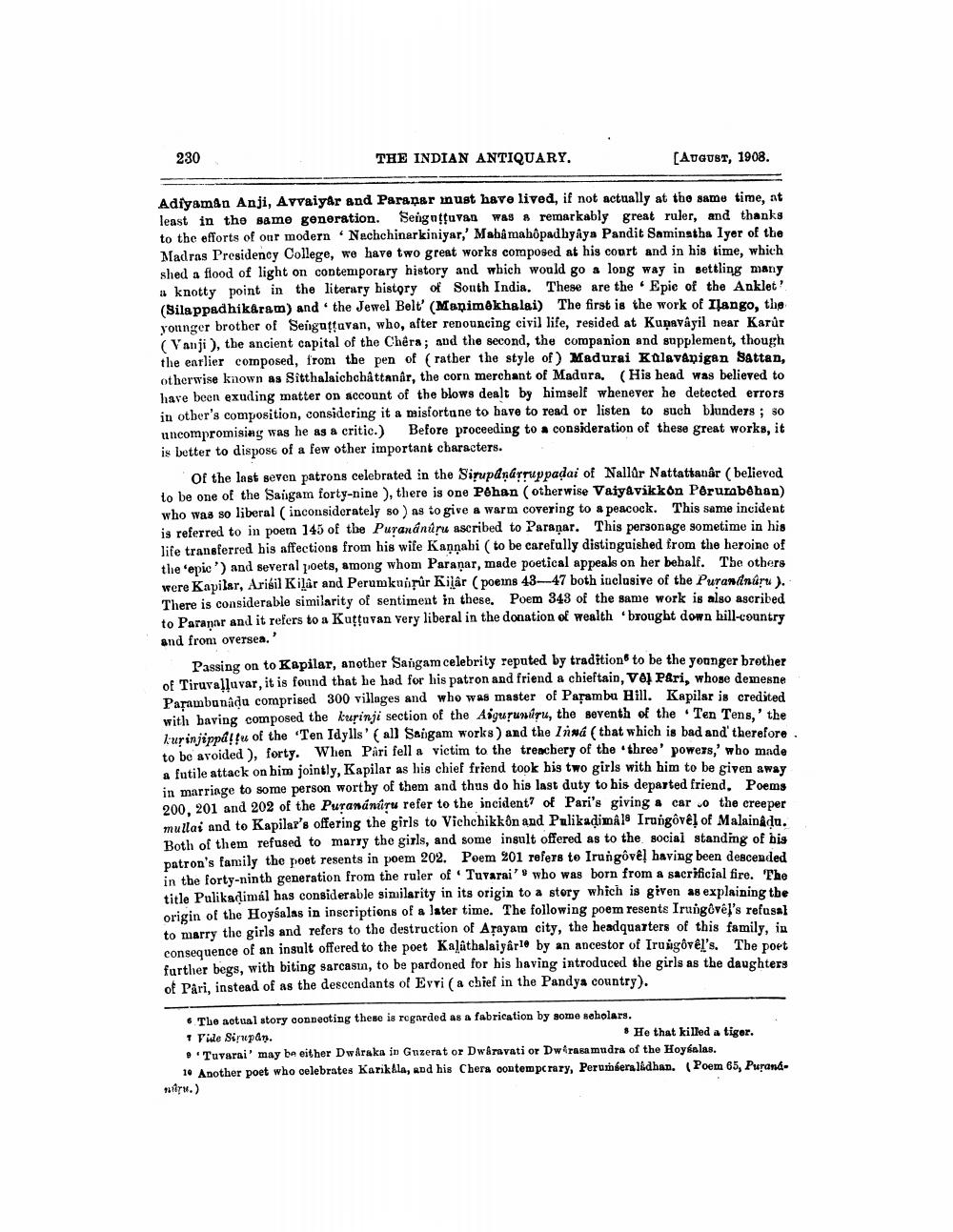________________
230
THE INDIAN ANTIQUARY.
[August, 1908.
Adiyaman Anji, Avvaiyar and Paranar inust have lived, if not actually at the same time, at least in the same generation. Seigutuvan W&S & remarkably great ruler, and thanks to the efforts of our modern Nechchinarkiniyar,' Mabâ mahôpadhyâya Pandit Saminstha lyer of the Madras Presidency College, we have two great works composed at his court and in his time, which shed a flood of light on contemporary history and which would go a long way in settling many a knotty point in the literary history of Sonth India. These are the Epic of the Anklet! (Silappadhikaram) and the Jewel Belt' (Manimékhalai) The first is the work of Ilango, the yonnger brother of Sengattuvan, who, after renouncing civil life, resided at Kuņavâyil near Karur (Vanji), the ancient capital of the Chêra; and the second, the companion and supplement, though the enrlier composed, from the pen of (rather the style of) Madurai Kulavanigan Sattan, otherwise known as Sitthalaichchâttanár, the corn merchant of Madura. (His head was believed to have been exuding matter on account of the blows dealt by himself whenever he detected errors in other's composition, considering it a misfortune to have to read or listen to such blunders ; so uncompromising was he as a critic.) Before proceeding to a consideration of these great works, it is better to dispose of a few other important characters.
of the last seven patrons celebrated in the Sirupdrarruppadai of Nallar Nattattauâr (believed to be one of the Sangam forty-nine), there is one Pehan otherwise Vaiyavikkon Perurabehan) who was so liberal (inconsiderately so as to give a warm covering to a peacock. This same incident is referred to in poem 145 of the Puranánari ascribed to Paranar. This personage sometime in his life transferred his affections from his wife Kaņņahi ( to be carefully distinguished from the heroine of the 'epie') and several poets, among whom Parañar, made poetical appeals on her behalf. The others were Kapilar, Aribil Kilar and Perumkuisůr Kilar (poeins 43-47 both inclusive of the Puranlinúru ). There is considerable similarity of sentiment in these. Poem 343 of the same work is also ascribed to Paranar and it refers to a Kuttuvan very liberal in the donation of wealth brought down hill-country and from oversea.'
Passing on to Kapilar, another Sangam celebrity reputed by tradition to be the younger brother of Tiruvalluvar, it is found that he had for his patron and friend a chieftain, Vol Pari, whose demesne Parambunadu comprised 300 villages and who was master of Parambu Hill. Kapilar is credited with baving composed the kurinji section of the Asyusunúru, the seventh of the Ten Tens.' the kurinjippd I tu of the "Ten Idylls' (all Sangam works) and the land that which is bad and therefore. to be avoided ), forty. When Pâri fell a victim to the treachery of the three powers,' who made a futile attack on bim jointly, Kapilar as his chief friend took his two girls with him to be given away in marringe to some person worthy of them and thus do his last duty to his departed friend. Poems 200, 201 and 202 of the Puranánúru refer to the incident of Pari's giving a car o the creeper mullai and to Kapilar's offering the girls to Vichchikkôn and Pulikadimalo Irungôvél of Malainádu. Both of them refused to marry the girls, and some insult offered as to the social standing of his patron's family the poet resents in poem 202. Poem 201 refers to Irungôve] having been descended in the forty-ninth generation from the ruler of Tuvarai' who was born from a sacrificial fire. The title Pulikadimal has considerable similarity in its origin to a story which is given as explaining the origin of the Hoysalas in inscriptions of a later time. The following poem resents Irungavel's refusal to marry the girls and refers to the destruction of Arayam city, the headquarters of this family, in consequence of an insult offered to the poet Kalathalaiyârie by an ancestor of Irungovēl's. The port further begs, with biting sarcasın, to be pardoned for his having introduced the girls as the daughters of Påri, instead of as the descendants of Eyvi (a chief in the Pandya country).
. The actual story connecting these is regarded as a fabrication by some scholars. + Fide Sirupan.
• He that killed a tiger. Tuvarai' may be either Dwaraka in Guzerat or Dwaravati or DwArasamudra of the Hoysalas. 10 Another poet who celebrates Karik Ala, and his Chera contemporary, Perumieruladhan. (Poem 65, Purana. turn.)




